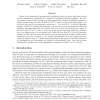116
click to vote
CORR
1999
Springer
15 years 1 months ago
1999
Springer
In this article, we study parameterized complexity theory from the perspective of logic, or more specifically, descriptive complexity theory. We propose to consider parameterized ...
114
click to vote
SIAMCOMP
2008
15 years 2 months ago
2008
We show that neither Resolution nor tree-like Resolution is automatizable unless the class W[P] from the hierarchy of parameterized problems is fixed-parameter tractable by randomi...
105
click to vote
CJ
2008
15 years 2 months ago
2008
We survey results and open questions on complexity of parameterized problems on digraphs. The problems include the feedback vertex and arc set problems, induced subdigraph problem...
126
click to vote
COCO
2004
Springer
15 years 5 months ago
2004
Springer
Based on the framework of parameterized complexity theory, we derive tight lower bounds on the computational complexity for a number of well-known NP-hard problems. We start by pr...
106
click to vote
IWPEC
2004
Springer
15 years 7 months ago
2004
Springer
We consider parameterized problems where some separation property has to be achieved by deleting as few vertices as possible. The following five problems are studied: delete k ve...
157
Voted
SODA
2010
ACM
15 years 11 months ago
2010
ACM
Bidimensionality theory appears to be a powerful framework in the development of meta-algorithmic techniques. It was introduced by Demaine et al. [J. ACM 2005 ] as a tool to obtai...
124
Voted
ICML
2002
IEEE
16 years 2 months ago
2002
IEEE
In a multi-view problem, the features of the domain can be partitioned into disjoint subsets (views) that are sufficient to learn the target concept. Semi-supervised, multi-view a...

